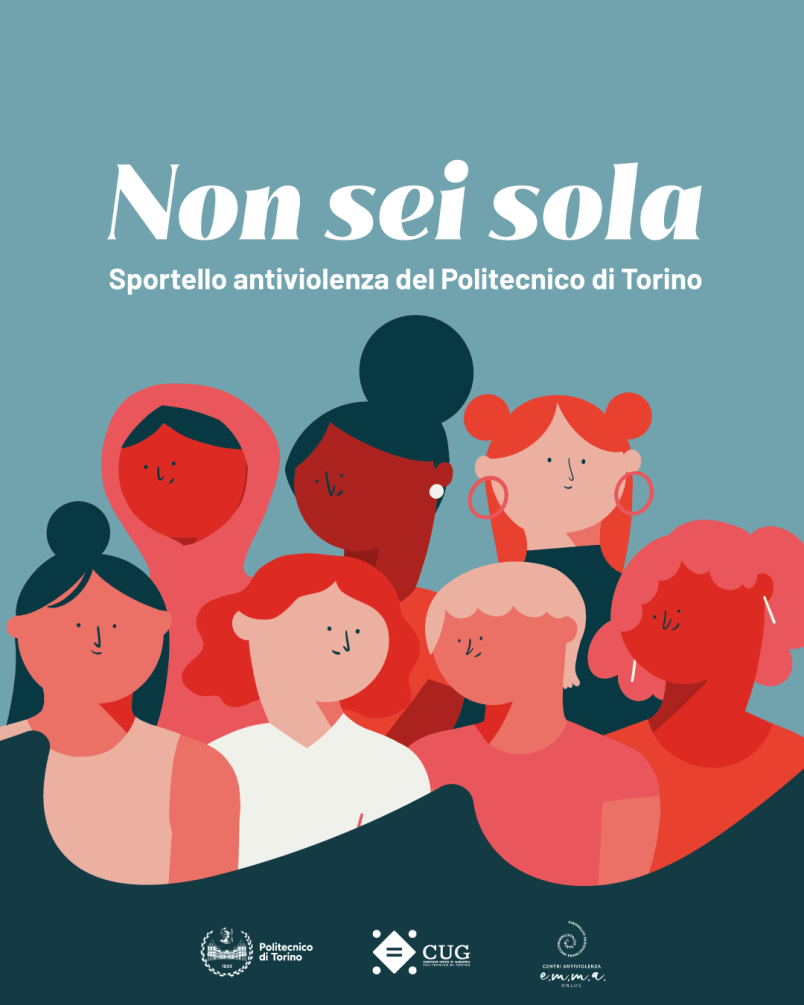
"The society of the future needs different creative contribution from each of us."
What does Politecnico di Torino pursue through equal opportunities and inclusion principles?
Our University starts from the recognition of the legal and social equality of each individual, regardless of gender, religion, ethnicity, disability, age, sexual or political orientation. The aim is to enhance the differences to improve everyone's quality of life by responding effectively to the transformations of society.
The purpose of Equal Opportunities policies is to overcome unfavorable conditions through the achievement of an effective equality in employment and student life that removes all forms of discrimination and accompanies inclusion through awareness-raising, training and other positive actions.
As mentioned in the introduction, the overall goal remains equality regardless of gender and special needs; a high goal that can be pursued while respecting and valuing the parameters of individuals such as religion, ethnicity, sexual orientation or politics.
As part of the policies to promote the inclusion of the LGBTQI+ community of the University, thus enhancing diversity, and in an attempt to give concrete follow-up to Art. 6 of the ethical code of the University (Dignity and respect for others) an event was held on June 21 with the emblematic title Questioni d’identità: il Politecnico di Torino e la lotta alle discriminazioni, organized with the scientific coordination of Daniele Marchisio, the support of Life service and with the sponsorship of the CUG PoliTO and UniTO.
On June 17, 2022, the Gender Research Group at the Politecnico di Torino, in collaboration with Arcigay Torino Circolo Ottavio Mai, the association Famiglie Arcobaleno and CUG PoliTO, organized Stories of Pride: an event that, in the month traditionally dedicated to pride, brought the stories, experiences and emotions of queer activists inside Politecnico di Torino; a meeting that, through small groups of telling, listening and confrontation, fostered political awareness on the issue.
In the religious field, the project of a virtual platform of spiritual support is being finalized in order to allow the Politecnico community to meet the different religious and areligious confessions.
Politecnico di Torino aims to create the conditions of inclusion, equity and hospitality as shown here and has also adhered to the UNHCR manifesto for inclusive universities.
In September 2020 a Working Table was set up to promote the planning of actions in support of refugees and women refugees: a topic that, although updated by the tragic situation in Afghanistan, has long been affecting our communities, calling us to take responsibility and launch initiatives to ensure living conditions, study and work that at least partly mitigate the drama of those who live in this situation.
Coordinator of this table Claudia De Giorgi as Vice Rector for Quality Welfare and Equal Opportunities with Laura Montanaro (Pro-Rector) as auditor and other participants: David Chiaramonti (Vice Chancellor for Internationalization), Michele Bonino (Rector's Delegate for International Relations w/China and East Area), Beppe Quaglia (Scope Coordinator Inclusion and Equity - Green Team), Arianna Montorsi (Rector's Referent for Gender Equality and Diversity), Daniela Bosia (Rector's Referent for Initiatives to Support Care, social integration and rights of disabled people), Francesca De Filippi (University Coordination for Development Cooperation), Tania Cerquitelli (CUG President) with a representation of the CUG (including the representative of PhD students), Paola Ghione (Head of LIFE Service and Diversity & Disability Manager of the University) and Elisa Armando (Head of Internationalization Area).
Our university, among the first public administrations to do so, in December 2019 created the post of Diversity and Disability Manager with the aim of activating actions to enhance and respect all the diversities present in the organizational context and to create an open and inclusive climate and foster the shared growth of our organization.
The position, held by Dr. Paola Ghione until 31 December 2023 and which from November 2022 had become Diversity Manager, envisaged the functions of implementing the University's strategic programmes on the subject of recognizing gender differences and their value with a view to employer branding, identifying and activating services and solutions to support the autonomy of people with disabilities in the University and to promote and guarantee the application of Law 68/1999.
Since 1 January 2024, these activities have been included in the broader Diversity Management area, for which Professional People&Diversity Management, Dr Cinzia Ninetto, is referent; in her role, she is responsible for preparing organizational arrangements and technological solutions to facilitate the integration of people with disabilities into the workplace, checking the implementation of the process of integration of people with disabilities into the workplace and into the educational pathways of the university, and receiving and reporting to the competent structures any situations of discomfort and integration difficulties. It is also responsible for analyzing and assessing the training needs of people with disabilities and the managers of the University structures.
What is sexual harassment?
It is undesirable conduct with sexual connotations, expressed physically, verbally and non-verbally, with the aim or the effect of violating the victim’s dignity and creating an intimidatory, hostile, degrading, humiliating or offensive situation.
The person appointed by the University to provide assistance and advice to anyone (student, faculty or technical administrative librarian staff) who has suffered discrimination or sexual harassment or harassment is the Confidential Counselor: one of the figures assigned to implement the principles of Codice Etico for the protection of the dignity of female workers and the student population of the Politecnico di Torino.
As part of the University initiatives to combat harassment, with the help of the previous Confidential Counselor Avv. Arianna Enrichens and in collaboration with Life service, which at the time belonged to PSQL Area, and the University Legal Affairs service, now Avvocatura Staff Structure, a short Guide against harassment has been arranged.
The Guide aims to contribute to spreading awareness on the phenomenon of harassment and on the existing protection tools.
In order to encourage collective reflection on the topic and on the role of each person in creating a responsible climate, two interactive video lessons were held in 2021, introduced by a video of the Rector, edited by the Councilor of Trust.
The first meeting was dedicated to identifying and recognizing stereotypes, the second to the existing protection tools: the recording of the lessons is available here.

From Wednesday 5th June 2024 an Anti-Violence Help Desk will open at the Politecnico di Torino, managed by the victim support officers of “Centri Antiviolenza E.M.M.A. Onlus”, as part of an experimental collaboration started with the Equality Committee (CUG). On Wednesdays, from 2.30pm to 5.30pm, a listening and support space is available for women who suffer or have suffered violence.
For further information, you can consult the PoliTO page dedicated to the Anti-Violence Help Desk.
The ‘alias career’ is intended to create an alternative identity that replaces the personal data with the ‘chosen’ name chosen by the person in transition, within the administrative management information system, as reported in the Guidelines for Italian Universities on the Implementation of the Career Alias by the National Conference of Equality Bodies of Italian Universities.
The Academic Senate of the Politecnico, in its meeting of 20 July 2021, approved the adoption of a new procedural procedure for the activation of alias careers for the student population, updating it in accordance with the above-mentioned Guidelines.
This administrative procedure was subsequently extended to the entire polytechnic community (assignees, doctoral students, lecturers, researchers, managers, technical-administrative staff, librarians, technologists and CELs), as detailed in the Guidelines for the activation and management of alias careers for the polytechnic community, approved by the Academic Senate at its meeting of 14 July 2022.
The alias identity is exclusively internal and is governed by a specific agreement between the applicant and the polytechnic.
For ease of reading, the following is a summary of the procedures to be followed for the student population and for staff.
Summary of the 'alias career' application procedure for the student population
Summary of the 'alias career' application procedure for staff
For any further information or discussion needs, please contact Professional People&Diversity Management at diversity.management@polito.it
